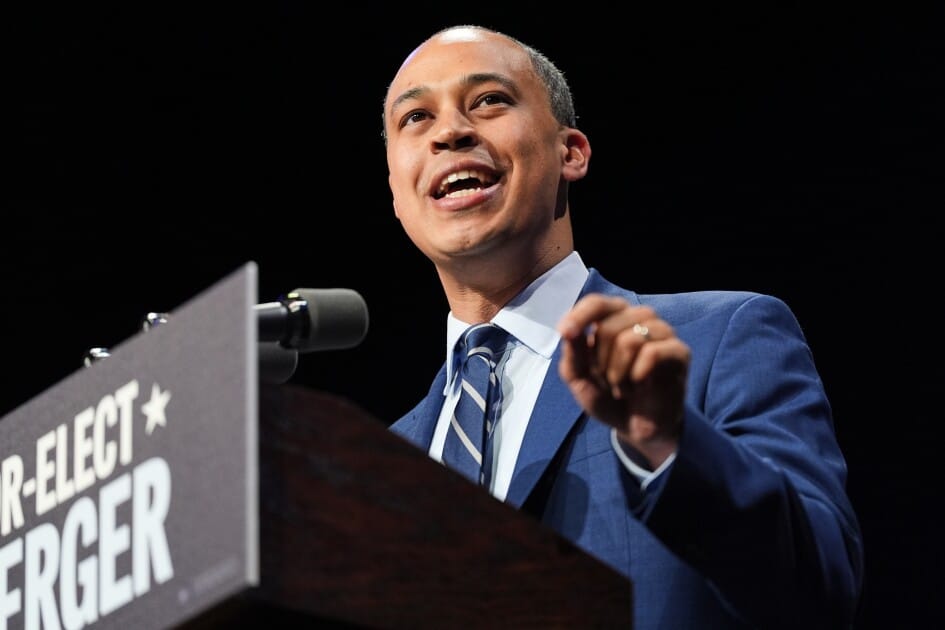Although education wasn’t the main focus of high-profile races that dominated ballots Tuesday in New Jersey, New York City, and Virginia, the outcomes of those contests will have implications for schools—and for how much resistance President Donald Trump’s education policies encounter as his second term continues.
Elsewhere, voters selected school board candidates, directly shaping the course for their local schools.
Here are four education-related takeaways from the election.
1. There could be one more state joining multistate coalitions challenging Trump’s education policies.
Democrats will take two key offices in Virginia from Republicans, with voters electing Abigail Spanberger as governor and Jay Jones as attorney general. With the pair clinching state leadership posts, Democratic states have another ally as they file multistate lawsuits to challenge Trump administration policies.
Since Trump took office in January, there have been at least 68 lawsuits challenging the president’s actions on education, with at least 12 coming from coalitions of states with Democratic attorneys general, according to an Education Week analysis. Several of those efforts have led to at least temporary restorations of grant funding and judicial orders blocking Trump policies.
Jones defeated incumbent Jason Miyares, a Republican endorsed by Trump.
Spanberger, who will replace term-limited Republican Gov. Glenn Youngkin, beat out Republican Lt. Gov. Winsome Earle-Sears. The Democrat’s win marks a pendulum swing from Youngkin, who took the top office in 2022 after running on a parents’ rights platform that seized on frustration with schools that accelerated during pandemic closures.
The defeat of Earle-Sears also gives more state support to five northern Virginia school districts under pressure from the Trump administration to change their transgender student policies or lose funding.
Earle-Sears has rebuked policies that allow transgender students to use bathrooms that align with their gender identity, according to the Virginia Mercury. Youngkin and Miyares have sided with the Trump administration as it has instituted funding restrictions on the five districts.
2. Candidates opposed to conservative culture war politics won some key school board races.
In Pennsylvania’s Bucks County, a bellwether for the swing state’s political leanings, voters elected a slate of Democrats to school boards.
In one of those suburban Philadelphia districts, Central Bucks, the 2021 election of a slate of Republicans who banned pride flags, books about LGBTQ+ people and history, and “sexualized content” in schools sparked a backlash.
Voters installed primarily Democrats in 2023 before doing so again on Tuesday, after which the nine-member board will be fully Democratic.
Pennsylvania is one of a handful of states that have partisan school board elections.
In other elections nationwide, voters steered away from “culture war” issues in schools. The candidate who opposed the removal of an “Everyone Is Welcome Here” sign in an Idaho classroom earlier this year prevailed over the incumbent.
3. In New York City, a new mayor and Trump will spar, with schools occasionally in the crossfire.
Trump has not minced words when it comes to New York’s democratic socialist Mayor-elect Zohran Mamdani, endorsing former Gov. Andrew Cuomo, who sought a political comeback as an independent. But Mamdani beat out Cuomo to lead the nation’s largest city and oversee the largest school district.
Mamdani vowed to address the teaching shortage with an initiative to train, certify, and hire thousands of new teachers. He supports the end of mayoral control of the city’s schools, which gives the mayor governing power of the city’s schools, including the ability to handpick a chancellor to lead the system.
But Mamdani could face a bigger battle than just within the confines of the city, as Trump has repeatedly targeted those who oppose him.
He’s placed the National Guard in cities under Democratic leadership. He’s threatened to cut off federal education funding to Maine and California after sparring with the Democratic governors there.
And New York is no stranger to the tactics: Trump’s administration has also sought to stifle funding to New York schools over the state’s Native American mascot policy, and the Education Department cut off $47 million in funding to New York City magnet schools over the city’s transgender bathroom policies.
Trump also hacked school desegregation grants that benefited city schools, and broadly froze about $18 billion to the city in October. Trump has already explicitly said he’d block funding to New York City if Mamdani won.
Mamdani immediately picked up the challenge Tuesday night, according to the Associated Press.
“So Donald Trump, since I know you’re watching, I have four words for you: Turn the volume up!” Mamdani said.
4. Free school meals succeed on the ballot
Colorado again codified free school breakfast and lunch for all public school students after voters passed a measure Tuesday.
Under the proposition, increased taxes on households that earn at least $300,000 will fund school meals for children, provide raises for school meal staff, and support district purchases of locally sourced food, according to the Colorado Sun.
It’s the second time the state has voted to provide free meals to kids; the policy reappeared on the ballot this year after state funding for the program began to dry up.
Universal free school meals have gained momentum in the years since the COVID-19 pandemic. From 2020 through June 2022, the federal government covered the cost of school meals for all public school children. Though that temporary policy ended, the Biden-Harris administration in 2023 made it easier for schools to qualify for reimbursement to serve free meals to all students through the community eligibility provision.
But conservatives have taken aim at the policies.
Project 2025, the conservative policy agenda created by the Heritage Foundation with the help of officials who serve in Trump’s administration, suggests eliminating the community eligibility provision and rejecting efforts to achieve universal free school meals.
2025-11-05 20:12:29
Source link

